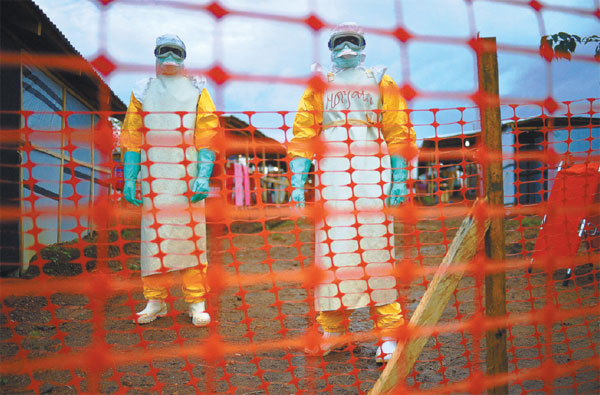Health workers make ultimate sacrifice to battle Ebola
Doctors, nurses often blindsided by patients who hide their symptoms
Placed in a disinfected coffin and driven alongside two bagged bodies on a flatbed truck, Modupeh Cole was buried without ceremony, tribute or tears, far away from his loved ones.
The eminent doctor, a specialist of some renown at the Connaught Hospital in Sierra Leone's capital of Freetown, had been exposed to the deadly Ebola virus less than two weeks earlier.
|
Doctors Without Borders medical staff members wearing protective clothing work at their facility in Kailahun on Thursday. Kailahun is at the epicenter of the worst Ebola outbreak to date. Carl De Souza / Agence France-Presse |
Examining a patient who, colleagues said, was probably the first Ebola case in the hospital's 102-year history, he had no idea of the danger he was in.
Cole, who was in his mid-fifties, began to complain of a fever and severe headaches shortly after seeing his patient.
He was transferred to the specialized Ebola treatment center run by global aid charity Doctors Without Borders in the eastern town of Kailahun.
Despite benefiting from the best care and expertise on Ebola available, he was dead within a few days.
"(Connaught) is a place where they see general patients, patients with all sorts of conditions,"said Samuel Patrick Massaquoi, a onetime protege of Cole's and now medical superintendent at the Kailahun Government Hospital.
"And when we had the outbreak, especially adult patients, they will hide their signs and symptoms - they will not tell you how they feel.
"They will present themselves to you in any one of these hospitals in the country saying, 'I have malaria, I have typhoid'. That was how it happened."
Surgical precision
The last days of an Ebola victim can be grim, with the most severe cases succumbing to agonizing muscular pain, vomiting, diarrhea and catastrophic hemorrhaging described as "bleeding out"as their organs break down.
Despite the best efforts of health professionals, there is little dignity for victims of Ebola, even in death.
Belongings must be burned, and often burials are witnessed only by gravediggers.
"Families often stay away from burials with Ebola, but they can come later because we keep a list of who is buried and where,"said the manager of the Health Ministry crew in charge of interring Cole.
"We contacted the doctor's family, but they said to go ahead straightaway."
Ebola, classified as one of the world's most virulent and contagious pathogens, spreads through contact with bodily fluids, and victims are particularly contagious in the days after death.
The removal of Cole's body from the center on Thursday was carried out not with eulogies, coffin bearers or hymns but in an operation orchestrated with surgical precision.
The doctor was among dozens of healthcare workers who have paid the ultimate price for their efforts to contain the disease.
Sierra Leone disclosed on Thursday that 32 nurses died of the Ebola virus from May 24 to Aug 13 while performing their duties.



















